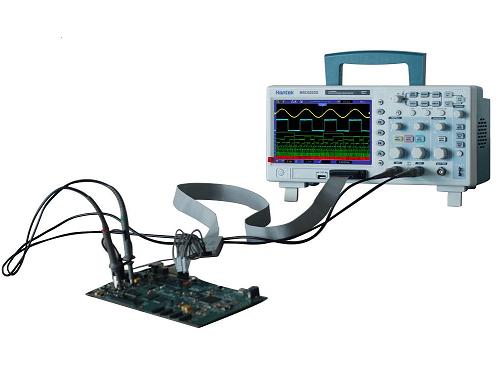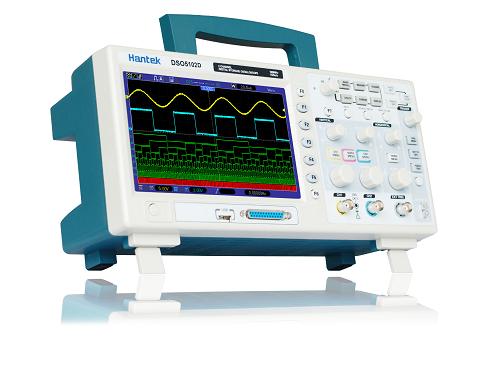


Hantek Mixed Signal Digital Storage Oscilloscope MSO5000D series coming!
16 logical channels (divided into 2 groups) 2 analog channels external trigger channel; 1M memory depth; 1GSa/s real time sampling rate; 7 inch TFT color display (800 x 480); powerful trigger function.
Accessories

|
 |
 |
 |
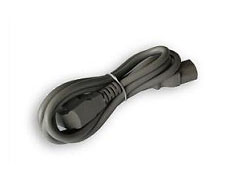 |
 |
Other Pictures
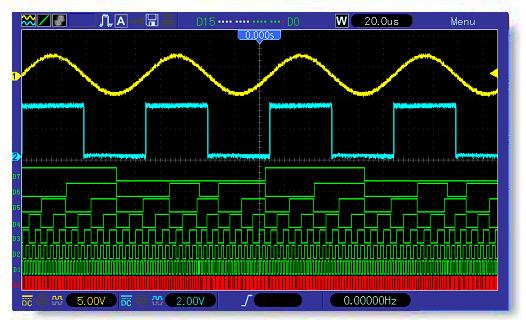
|
|
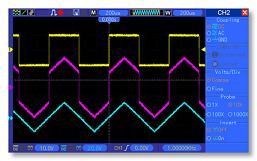
|
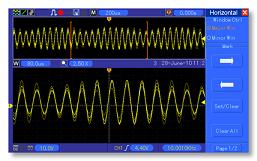
|
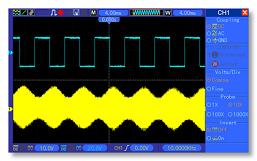
|
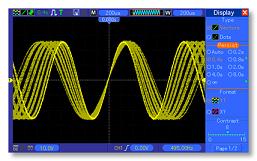
|
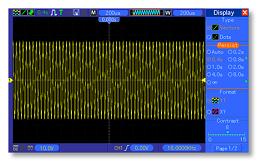
|
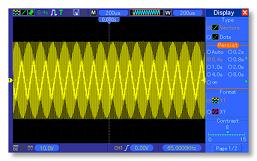
|
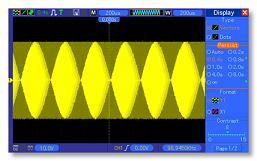
|
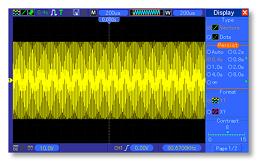
|
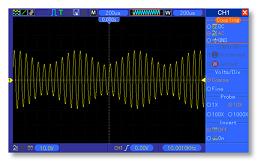
|
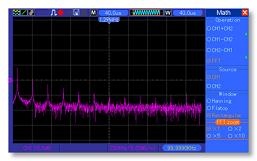
|
* Oscilloscope Function
* Logic Analyzer Function
Specification
|
Oscilloscope Specification |
||||||||||
|
Horizontal |
||||||||||
|
Model |
MSO5062D |
MSO5102D |
MSO5202D |
|||||||
|
Bandwidth |
60MHz |
100MHz |
200MHz |
|||||||
|
Sampling RateRange |
Max. 1GS/s |
|||||||||
|
Waveform Interpolation |
( sin x) /x |
|||||||||
|
Memory Depth (Sample Points) |
Single-channel: maximum1M; Dual-channel: maximum 512K (4K, 16K, 40K optional) |
|||||||||
|
SEC/DIV Range |
8ns/div-40s/div (stepping in a sequence: 2,4,8) |
|||||||||
|
Sampling Rate and Delay Time Accuracy |
±50ppm in any ≥1ms time intervals |
|||||||||
|
Delta Time Measurement Accuracy (full bandwidth)
|
Single, "sampling" mode ± (1 sampling interval +100ppm x readings +0.6 ns) |
|||||||||
|
> 16 times above average ± (1 sampling interval +100ppm x readings+ 0.4 ns) |
||||||||||
|
Sampling interval = SEC/DIV?200 |
||||||||||
|
Vertical |
||||||||||
|
A/D Converter |
8-bit resolution, each channel sampled simultaneously |
|||||||||
|
VOLTS/DIV Range |
2mV/div ~ 5V/div at input BNC |
|||||||||
|
Position Range |
±400mV (2mV/div ~20mV/div) ±2V (50mV/div ~200mV/div) ±40V (500mV/div ~2V/div) ±50V (5V/div) |
|||||||||
|
Optional Analog Bandwidth Limit (typical) |
20MHz |
|||||||||
|
Low Frequency Response (-3db) |
≤10Hz at output BNC |
|||||||||
|
Rising Time at output BNC (typical) |
60MHz |
100MHz |
200MHz |
|||||||
|
≤ 5.8ns |
<3.5ns |
<1.8ns |
||||||||
|
Vertical Gain Accuracy |
±3% for sample or average acquisition mode, 5V/div to 10mV/div; ±4% for sample or average acquisition mode, 5mV/div to 2mV/div |
|||||||||
|
DC Measurement Accuracy Average Acquisition Mode |
Measuring type: ≥16 zero vertical position waveform average. Accuracy: ± (3% x reading +0.1div +1 mV), applicable to 10 mV/div or above units. |
|||||||||
|
Measuring type: ≥16 non-zero vertical position waveform average. Accuracy: ± [3%x (readings vertical position) + 1% x vertical position + 0.2div]. For the setting from 2mV/div to 200mV/div, 2mV; for 200mV/div to 5V/div, 50mV. |
||||||||||
|
Voltage Measurement Repeatability Average Acquisition Mode |
In the same settings and environmental conditions, acquisition ≥ the voltage increment between any two groups average of 16 above waveforms : ± (3% x readings + 0.05 div) |
|||||||||
|
Trigger |
||||||||||
|
Trigger Sensitivity (Edge Trigger Type) |
Coupling |
Sensitivity |
||||||||
|
DC |
Source |
60MHz |
100MHz |
200MHz |
||||||
|
CH1 CH2 |
1div from DC to 10MHz, 1.5div from 10MHz to Full |
1.5div from 10MHz to 100MHz, 2div from 100MHz to Full |
||||||||
|
EXT |
200mV from DC to 100MHz |
200mV from DC to 100MHz, 350mV from 100MHz to 200MHz |
||||||||
|
EXT/5 |
1V from DC to 100MHz |
1V from DC to 100MHz, 1.75V from 100MHz to 200MHz |
||||||||
|
AC |
Attenuates signals below 10Hz |
|||||||||
|
HF Reject |
Attenuates signals when above 80kHz |
|||||||||
|
LF Reject |
The same as DC coupling limit when frequency above 150kHz; Attenuates signals when below 150kHz. |
|||||||||
|
Trigger LevelRange |
Source |
Range |
||||||||
|
CH1, CH2 |
±8 divisions from center of screen |
|||||||||
|
EXT |
±1.2V |
|||||||||
|
EXT/5 |
±6V |
|||||||||
|
Trigger Level Accuracy, typical (Accuracy is for signals having rise and fall time ≥ 20ns) |
Source |
Accuracy |
||||||||
|
CH1, CH2 |
±(0.2div x V/div) (within ±4 divisions from center of screen) |
|||||||||
|
EXT |
±(6% of setting 40mV) |
|||||||||
|
EXT/5 |
±(6% of setting 200mV) |
|||||||||
|
Set Trigger Level to 50% (typical) |
For the input signals ≥ 50Hz |
|||||||||
|
Video Trigger Type |
Source |
Range |
||||||||
|
|
CH1, CH2 |
The amplitude of 2 points peak-peak |
||||||||
|
EXT |
400mV |
|||||||||
|
EXT/5 |
2V |
|||||||||
|
Signal Format , Field Rate and Video Trigger Type |
Any field or any line support NTSC PAL and SECAM |
|
||||||||
|
Holdoff Range |
100ns-10s |
|
||||||||
|
Pulse Width Trigger |
||||||||||
|
Mode |
When <, >, =, or ≠ trigger; positive or negative pulses. |
|||||||||
|
Trigger Point |
=: Triggers when pulse falling edge over trigger level. ≠: If the pulse narrower than the appointed width, the trigger point is the falling edge; or triggers when the pulse duration longer than the width setting time. < : Triggers when the pulse duration less than the width setting time. >(Also called overtime trigger): Triggers when pulse is greater than width setting. |
|||||||||
|
Range |
20ns ~10s |
|||||||||
|
Slope Trigger |
||||||||||
|
mode |
When <, >, =, or ≠ trigger; positive or negative slopes. |
|||||||||
|
Trigger Point |
=: Triggers when waveform slope is equal to slope setting. ≠: Triggers when waveform slope is not equal to slope setting. <: Triggers when waveform slope is less than slope setting. >: Triggers when waveform slope is greater than slope setting. |
|||||||||
|
Range |
20ns-10s |
|||||||||
|
Overtime Trigger |
From the rising or falling edge; Setup time: 20-10 s |
|||||||||
|
Alternative Trigger |
||||||||||
|
CH1 |
Internal trigger: edge, pulse, video, or slop |
|||||||||
|
CH2 |
Internal trigger: edge, pulse, video, or slop |
|||||||||
|
Trigger Frequency Counter |
||||||||||
|
Readout Resolution |
6bit |
|||||||||
|
Accuracy (typical) |
±30ppm (Including all of the frequency reference error and ±1 calculation error) |
|||||||||
|
Frequency Range |
AC coupling, from minimum 4Hz to specified bandwidth |
|||||||||
|
Source |
"Pulse width" or "edge trigger" mode: all available trigger source "Frequency counter" is always measuring the trigger source, even when oscilloscope acquisition paused because of the operation state’s changing, or when a single acquisition finished. The “pulse width" trigger mode: the oscilloscope calculates the pulses whose window having effective amplitude, which measure at 1s and meet trigger condition. For example, if the PWM pulse line is set to < mode, and width is correspondingly set to smaller time, then the narrow pulse among them is the one to be calculated. "Edge trigger" mode: the oscilloscope calculates all the edge with sufficient amplitude and correct polarity. "Video trigger" mode: "frequency counter" doesn't work. |
|||||||||
|
Acquisition |
||||||||||
|
Mode |
Sample, Peak value detection and Average |
|||||||||
|
SINGLE SEQ |
Acquisition Mode |
Acquisition Stop Time |
||||||||
|
|
Sample, peak value detect |
All communications start to single acquisition simultaneously |
||||||||
|
|
Average |
All communications start to N times acquisition simultaneously, and N could be 4, 8, 16, 32, 64 or 128 |
||||||||
|
Input |
||||||||||
|
Input Coupling |
DC, AC or GND |
|||||||||
|
Input Impedance, DC Coupling |
1MΩ±2% for 20pF±3 pF |
|||||||||
|
Probe Attenuation |
1X, 10X |
|||||||||
|
Support Probe Attenuation Coefficients
|
1X, 10X, 100X, 1000X |
|||||||||
|
Max. Input Voltage |
Overvoltage Type |
Max. Voltage |
||||||||
|
CAT I and CAT II |
Installation type: 300VRMS(10 x ) |
|||||||||
|
CAT III |
150VRMS(1 x ) |
|||||||||
|
Installation type Ⅱ: Take 20 dB/decade as slope, from 100kHz above begins to decline to ≥ 3MHz *, the AC peak value is 13V. For the non-sine waveforms, the peak value must less than 450V. Above 300V the offset duration should be less than 100ms. RMS signal level (including all the DC component delete by the AC coupling) must be limited to 300V. If beyond these values, it may damage the device. |
||||||||||
|
Measurement |
||||||||||
|
Cursors |
The difference between voltage cursors △V; the difference between time cursors △T; 1/△T calculated by Hz. |
|||||||||
|
Automatic |
Frequency, Period, Mean, Pk-Pk, Cyc RMS, Min, Max, Rise Time, Fall Time, Positive Width, Negative Width. |
|||||||||
|
General |
||||||||||
|
Display |
||||||||||
|
Type |
7" TFT, 64K true color LCD |
|||||||||
|
Resolution |
800x480 dots |
|||||||||
|
Contrast |
16 gears with the progress bar to show adjustment |
|||||||||
|
Probe Compensator Output |
||||||||||
|
Output Voltage (typical) |
About 5Vpp input ≥1 MΩ load |
|||||||||
|
Frequency (typical) |
1kHz |
|||||||||
|
Power Supply |
||||||||||
|
Voltage |
100-120VACRMS(±10%),45Hz to 440Hz, CATⅡ 120-240VACRMS(±10%),45Hz to 66Hz, CATⅡ |
|||||||||
|
Power |
< 30W |
|||||||||
|
Fuse |
2A, T rating, 250V |
|||||||||
|
Environment |
||||||||||
|
Temperature |
Working:32℉ to122℉(0℃to50℃) |
|||||||||
|
Not working:-40℉to159.8℉(-40℃to 71℃) |
||||||||||
|
Cooling Type |
Convection |
|||||||||
|
Humidity |
104 ℉or below ( 40 ℃or below) : ≤ 90% relative humidity |
|||||||||
|
106 ℉to122℉( 40 ℃to50℃) : ≤ 60% relative humidity |
||||||||||
|
Sea Level Height |
Working and Not working |
3,000m (10,000 foot) |
||||||||
|
|
Random Vibration |
50 Hz to 500 Hz:0.31 gRMS, each axial: 10 minutes |
||||||||
|
|
Not working |
5 Hz to 500 Hz:2.46 gRMS, each axial: 10 minutes |
||||||||
|
Mechanical Shock |
Working |
50g, 11ms, half-sine wave |
||||||||
|
Mechanical |
||||||||||
|
Dimension |
Length |
313mm |
||||||||
|
Height |
142mm |
|||||||||
|
Thickness |
108mm |
|||||||||
|
Weight |
Not including the weight of package and accessories |
2.08Kg |
||||||||
|
Packing Dimension |
Length |
395mm |
||||||||
|
Width |
410mm |
|||||||||
|
Height |
275mm |
|||||||||
|
Gross Weight |
Including all accessories |
about3.2kg |
||||||||
|
Logic Analyzer Specification |
||||||||||
|
Sampled Channels |
16 ( divided into 2 groups) |
|||||||||
|
Max. Input Impedance |
200K (C=10p) |
|||||||||
|
Input VoltageRange |
-60V~60V |
|||||||||
|
Logic ThresholdRange |
-8V~8V |
|||||||||
|
Max. Sample Rate |
500MHz |
|||||||||
|
Compatible Input |
TTL, CMOS, ECL |
|||||||||
|
Sample Depth |
512KSample |
|||||||||
|
Cursors |
The difference between voltage cursors △V; the difference between time cursors △T; 1/△T calculated by Hz. |
|||||||||
|
Measurement |
Period and Frequency |
|||||||||
|
Record Position |
RefA RefB |
|||||||||
|
Trigger |
Edge |
D0-D15 select slope (rising or falling edge) |
||||||||
|
Pulse Width |
D0-D15 select pulse polarity (positive or negative pulse), trigger when (=, ≠, >, <), trigger pulse width |
|||||||||
|
Code-type |
D0-D15 select code-type (H, L, X) |
|||||||||
|
Duration |
D0-D15 select persist time and trigger when (data terminate, data start, and data delay) |
|||||||||
|
Queue |
D0-D15 select specific data index (0-3) and code-type (H, L, X) |
|||||||||
|
Repeat |
D0-D15 select code-type (H, L, X) and repeat times |
|||||||||
Software
Operating system: Windows 7, Windows NT, Windows 2000, Windows XP,VISTA.
Others
